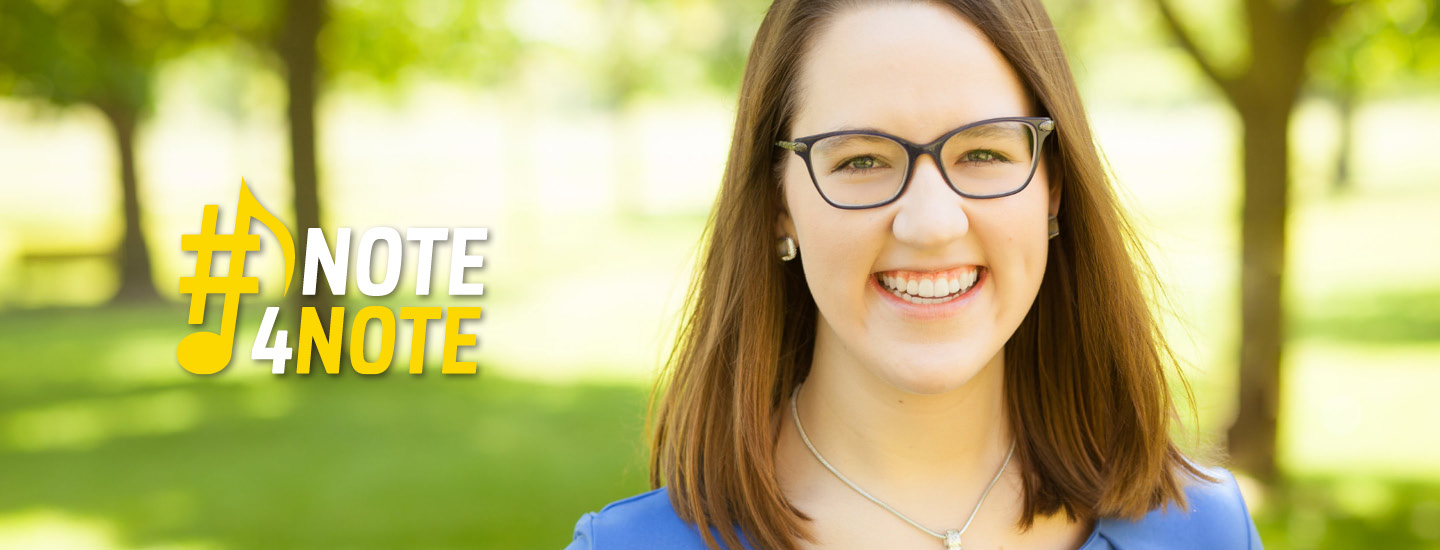Meet the 2018 #Note4Note Composer Karalyn Schubring!
We’re thrilled to have commissioned a new work from alum composer Karalyn Schubring in celebration of our 2018 #Note4Note Campaign! Learn more about the campaign (and see why this commission is extra special) by clicking here.
You were featured on From the Top as a composer and pianist when you were 17, at what age did you start thinking “I want to become a composer”?
When I was about 13 or 14. I feel very lucky that my parents enrolled me in piano lessons when I was three years old at the East Valley Yamaha Music School. Because my teachers were very encouraging of creativity, I started composing when I was six.
It wasn’t until I went to a Hiromi Uehara concert in the eighth grade that I realized how much fun improvising and writing music could be! By the time I entered high school, I knew I wanted to be a composer.
From where do you usually draw your inspiration while you’re composing, and does that source of inspiration change depending on the piece or project?
As much improvising at the piano as I do, recently I’ve been finding that my best ideas come when I’m away from the piano and doing a mindless activity, like showering or (especially) going for a walk. I listen to a lot of music related to the instrumentation I’m writing for to internalize the sound, and this eventually yields a musical idea that starts as a jumping-off point. Sometimes I start with a title or concept that I like and write music that matches with it.
[That From the Top is commissioning works from young artists] is particularly exciting to me because they’re taking a chance on young composers who are just beginning to break out in the world. This, to me, shows their commitment to investing in the next generation of musicians.
Is there a process or a method to your work?
My writing process generally feels like a very stretched-out improvisation, because I am quick to explore ideas without being certain of where they will take me. I down write all of my ideas on big sheets of staff paper (especially the bad ones!). If something strikes my interest, I’ll write a few measures more to explore the idea and see if it looks like it will lead somewhere promising.
When I find something that I like, I like to play a game with myself where I see how many variations I can come up with. Then, once I get about 20-40% of the way through the piece, I step back to determine a formal structure that will best support those ideas. When the piece is finished, I take another step back and consider how it makes me feel and what it reminds me of, and give it a title to match.
Of all the pieces you’ve written, is there one that stands out as your favorite? Why?
I wrote a saxophone octet during my freshman year at the University of Michigan called “Sunburst.” I think it’s my favorite because it’s full of energy, changing time signatures, a groovy backbeat, and catchy melody. I also like how it doesn’t fit neatly into any formal structure, but unfolds and develops organically over time. I remember having a lot of fun writing that piece, and it only took me a month to write!
You’re a student at the University of Michigan studying composition. Can you describe for us a bit of what composition private lessons look like?
I have an hour-long lesson each week, and this semester I’m studying with Bright Sheng. Lessons usually start with checking in on how I’ve been doing that week, then I show what I’ve written over the past few days at the piano or using MIDI playback. We talk about what works, what isn’t working, and what I am imagining will happen next. All of the teachers I have worked with at Michigan have been incredibly supportive in allowing me to work on whatever project I want to pursue, and I feel very grateful for that.
What would you say is important about commissions?
Commissioning artists creates a culture of acknowledging the importance of someone’s work, and reminds us of the fact that making art is work! Paying someone for their art helps them to meet their practical needs, which frees them up to spend their time and energy producing their best creative work.
What From the Top is doing is particularly exciting to me because they’re taking a chance on young composers who are just beginning to break out in the world. This, to me, shows their commitment to investing in the next generation of musicians.
The social media component of their campaigns is incredibly important, too, as they’re able to create a sense of community, buzz, and excitement about the creation of a new work across a wide audience.
Can you give us any hints to what the piece is about? Or are there any moments in the piece that mean something special to you?
This piece is all about joy!
Support Karalyn and From the Top by making a gift before #GivingTuesday on November 27!
Give Today via Our Facebook Fundraiser




